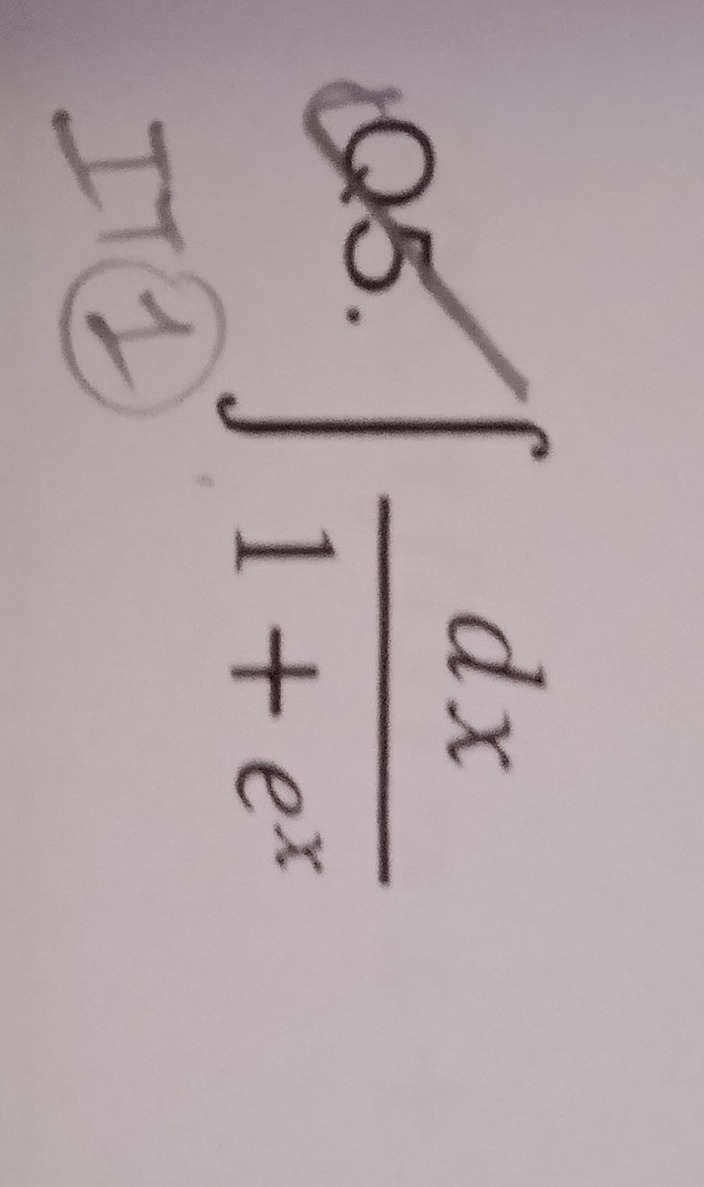Question
Question: $\text{II} \circled{1}, \int_{0.5}^{1}\frac{dx}{1+e^x}$...
II\circled1,∫0.511+exdx

0.5 + ln((1+√e)/(1+e))
Solution
The problem asks to evaluate the definite integral ∫0.511+exdx.
First, we find the indefinite integral ∫1+exdx. Let I=∫1+exdx. We can use a substitution method or algebraic manipulation.
Method 1: Algebraic Manipulation Multiply the numerator and denominator by e−x: I=∫e−x(1+ex)e−xdx=∫e−x+1e−xdx Let u=e−x+1. Then du=−e−xdx, which means e−xdx=−du. Substitute these into the integral: I=∫u−du=−ln∣u∣+C Substitute back u=e−x+1: I=−ln(e−x+1)+C Simplify the expression: I=−ln(ex1+1)+C=−ln(ex1+ex)+C Using logarithm properties ln(a/b)=lna−lnb: I=−(ln(1+ex)−ln(ex))+C I=−ln(1+ex)+ln(ex)+C Since ln(ex)=x: I=x−ln(1+ex)+C
Method 2: Substitution and Partial Fractions Let t=ex. Then dt=exdx, so dx=exdt=tdt. Substitute these into the integral: I=∫1+t1⋅tdt=∫t(1+t)1dt Decompose the integrand using partial fractions: t(1+t)1=tA+1+tB Multiply by t(1+t): 1=A(1+t)+Bt. Set t=0⟹1=A(1)⟹A=1. Set t=−1⟹1=B(−1)⟹B=−1. So, t(1+t)1=t1−1+t1. Now integrate: I=∫(t1−1+t1)dt=ln∣t∣−ln∣1+t∣+C Substitute back t=ex: I=ln(ex)−ln(1+ex)+C I=x−ln(1+ex)+C
Now, we evaluate the definite integral using the limits 0.5 and 1: ∫0.511+exdx=[x−ln(1+ex)]0.51 Apply the limits: =(1−ln(1+e1))−(0.5−ln(1+e0.5)) =(1−ln(1+e))−(0.5−ln(1+e)) =1−ln(1+e)−0.5+ln(1+e) Combine the constant terms and logarithm terms: =(1−0.5)+(ln(1+e)−ln(1+e)) =0.5+ln(1+e1+e)
The final answer is 0.5+ln(1+e1+e).
Explanation of the solution:
- Find the indefinite integral of 1+ex1. This is done by multiplying the numerator and denominator by e−x and then substituting u=e−x+1, or by substituting t=ex and using partial fractions. Both methods yield x−ln(1+ex).
- Apply the limits of integration using the Fundamental Theorem of Calculus: ∫abf(x)dx=F(b)−F(a), where F(x) is the antiderivative of f(x).
- Substitute the upper limit (x=1) and the lower limit (x=0.5) into the antiderivative and subtract the results.
- Simplify the expression using logarithm properties.
